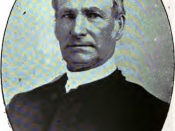Richard Wilbur's Contribution to American Culture
Thesis Statement
In Wilbur's poetry, signs of recurring impatience have been traced with the materialism of the metropole and the redemptive vision of a regionalist culture wedded to the soil.
Introduction
An American regionalism that defines itself through combat with the European metropole and its antitype, openness to the heritage of Europe, are not, however, irreconcilable. Wilbur shows that these apparent controversies can be resolved in synthesis. He is blessed with a capability that keeps a steady eye on the regional object and yet feels no sense of cultural betrayal or compromise in mediating these perceptions through "international" form. Wilbur is a poet acutely conscious of both poles in the argument. In an essay entitled "Regarding Places," he gives an account of a walk in the New England countryside with a friend, a friend so caught up with his internationalist art that he cannot respond to the local detail before him.
(Snodgrass, 122-26) Wilbur's vision is by contrast a covalent one--he is able to respond to his immediate setting as well as to the abstractions that obsess the cyclopean artist walking with him.
Wilbur has regionalist sympathies as vivid as the English poet's, however different his conception and practice of poetic form. Wilbur's mediate position between the extreme and finally impractical regionalism of poets like Williams not to mention the multicultural critics who succeed him and the geographically hollow position of exiles like T. S. Eliot can perhaps be ascribed to his New England heritage, the mildness of which is apparent in the very name "New England." Frank Wells has characterized its nineteenth-century culture as something based on the "curious marriage of provinciality and cosmopolitanism whereby they remained provincials in heart and cosmopolitans in mind." (Wells, 87)
Strict poetic forms are unlikely to...


